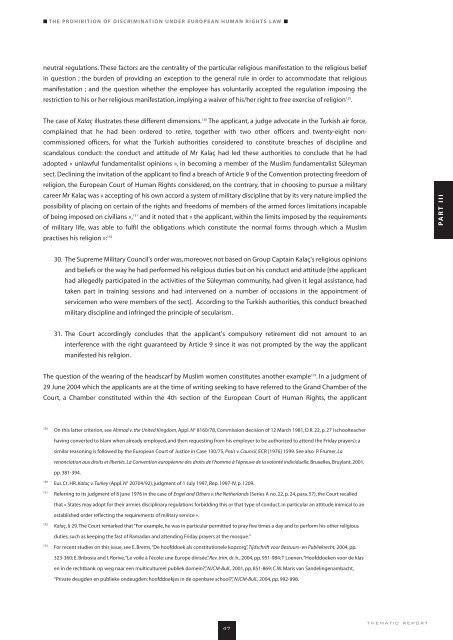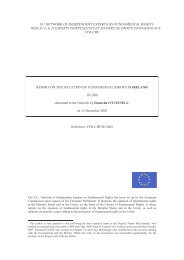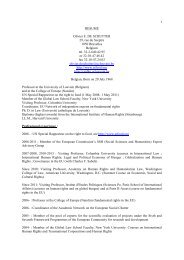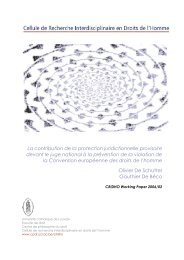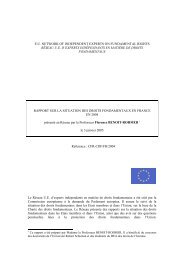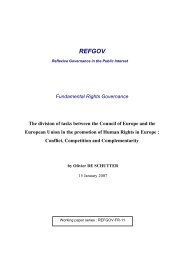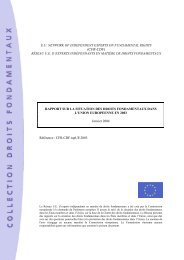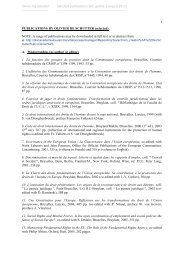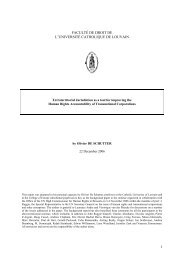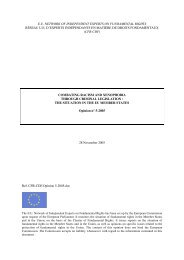The Prohibition of Discrimination under European Human ... - cridho
The Prohibition of Discrimination under European Human ... - cridho
The Prohibition of Discrimination under European Human ... - cridho
Create successful ePaper yourself
Turn your PDF publications into a flip-book with our unique Google optimized e-Paper software.
■ THE PROHIBITION OF DISCRIMINATION UNDER EUROPEAN HUMAN RIGHTS LAW ■<br />
neutral regulations. <strong>The</strong>se factors are the centrality <strong>of</strong> the particular religious manifestation to the religious belief<br />
in question ; the burden <strong>of</strong> providing an exception to the general rule in order to accommodate that religious<br />
manifestation ; and the question whether the employee has voluntarily accepted the regulation imposing the<br />
restriction to his or her religious manifestation, implying a waiver <strong>of</strong> his/her right to free exercise <strong>of</strong> religion125 .<br />
<strong>The</strong> case <strong>of</strong> Kalaç illustrates these different dimensions. 130 <strong>The</strong> applicant, a judge advocate in the Turkish air force,<br />
complained that he had been ordered to retire, together with two other <strong>of</strong>ficers and twenty-eight noncommissioned<br />
<strong>of</strong>ficers, for what the Turkish authorities considered to constitute breaches <strong>of</strong> discipline and<br />
scandalous conduct: the conduct and attitude <strong>of</strong> Mr Kalaç had led these authorities to conclude that he had<br />
adopted « unlawful fundamentalist opinions », in becoming a member <strong>of</strong> the Muslim fundamentalist Süleyman<br />
sect. Declining the invitation <strong>of</strong> the applicant to find a breach <strong>of</strong> Article 9 <strong>of</strong> the Convention protecting freedom <strong>of</strong><br />
religion, the <strong>European</strong> Court <strong>of</strong> <strong>Human</strong> Rights considered, on the contrary, that in choosing to pursue a military<br />
career Mr Kalaç was « accepting <strong>of</strong> his own accord a system <strong>of</strong> military discipline that by its very nature implied the<br />
possibility <strong>of</strong> placing on certain <strong>of</strong> the rights and freedoms <strong>of</strong> members <strong>of</strong> the armed forces limitations incapable<br />
<strong>of</strong> being imposed on civilians », 131 and it noted that « the applicant, within the limits imposed by the requirements<br />
<strong>of</strong> military life, was able to fulfil the obligations which constitute the normal forms through which a Muslim<br />
practises his religion »: 132<br />
30. <strong>The</strong> Supreme Military Council's order was, moreover, not based on Group Captain Kalaç's religious opinions<br />
and beliefs or the way he had performed his religious duties but on his conduct and attitude [the applicant<br />
had allegedly participated in the activities <strong>of</strong> the Süleyman community, had given it legal assistance, had<br />
taken part in training sessions and had intervened on a number <strong>of</strong> occasions in the appointment <strong>of</strong><br />
servicemen who were members <strong>of</strong> the sect]. According to the Turkish authorities, this conduct breached<br />
military discipline and infringed the principle <strong>of</strong> secularism.<br />
31. <strong>The</strong> Court accordingly concludes that the applicant's compulsory retirement did not amount to an<br />
interference with the right guaranteed by Article 9 since it was not prompted by the way the applicant<br />
manifested his religion.<br />
<strong>The</strong> question <strong>of</strong> the wearing <strong>of</strong> the headscarf by Muslim women constitutes another example133 . In a judgment <strong>of</strong><br />
29 June 2004 which the applicants are at the time <strong>of</strong> writing seeking to have referred to the Grand Chamber <strong>of</strong> the<br />
Court, a Chamber constituted within the 4th section <strong>of</strong> the <strong>European</strong> Court <strong>of</strong> <strong>Human</strong> Rights, the applicant<br />
129<br />
On this latter criterion, see Ahmad v. the United Kingdom, Appl. N° 8160/78, Commission decision <strong>of</strong> 12 March 1981, D.R. 22, p. 27 (schoolteacher<br />
having converted to Islam when already employed, and then requesting from his employer to be authorized to attend the Friday prayers); a<br />
similar reasoning is followed by the <strong>European</strong> Court <strong>of</strong> Justice in Case 130/75, Prais v. Council, ECR [1976] 1599. See also P. Frumer, La<br />
renonciation aux droits et libertés. La Convention européenne des droits de l’homme à l’épreuve de la volonté individuelle, Bruxelles, Bruylant, 2001,<br />
pp. 381-394.<br />
130<br />
Eur. Ct. HR, Kalaç v.Turkey (Appl. N° 20704/92), judgment <strong>of</strong> 1 July 1997, Rep. 1997-IV, p. 1209.<br />
131<br />
132<br />
133<br />
Referring to its judgment <strong>of</strong> 8 june 1976 in the case <strong>of</strong> Engel and Others v. the Netherlands (Series A no. 22, p. 24, para. 57), the Court recalled<br />
that « States may adopt for their armies disciplinary regulations forbidding this or that type <strong>of</strong> conduct, in particular an attitude inimical to an<br />
established order reflecting the requirements <strong>of</strong> military service ».<br />
Kalaç, § 29.<strong>The</strong> Court remarked that “For example, he was in particular permitted to pray five times a day and to perform his other religious<br />
duties, such as keeping the fast <strong>of</strong> Ramadan and attending Friday prayers at the mosque.”<br />
For recent studies on this issue, see E. Brems,“De ho<strong>of</strong>ddoek als constitutionele kopzorg”, Tijdschrift voor Bestuurs- en Publiekrecht, 2004, pp.<br />
323-360; E. Bribosia and I. Rorive,“Le voile à l’école: une Europe divisée”, Rev. trim. dr. h., 2004, pp. 951-984; T Loenen,“Ho<strong>of</strong>ddoeken voor de klas<br />
en in de rechtbank: op weg naar een multicultureel publiek domein?”, NJCM-Bull., 2001, pp. 851-869; C.W. Maris van Sandelingenambacht,<br />
“Private deugden en publieke ondeugden: ho<strong>of</strong>ddoekjes in de openbare school?”, NJCM-Bull., 2004, pp. 992-998.<br />
47<br />
thematic report<br />
PART III


